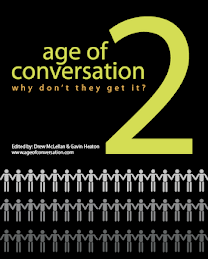You see, to some people those in front, speaking to the audience are there just to teach; but in reality, besides trying to share what knowledge we have to share, we are also there to learn, to take in new points of view, new ideas and even to remember or re-learn some stuff we thought forgotten.
And that is precisely what happened to me last Saturday during my participation in the Merkado 2009 conference in Acapulco; by the end of the presentation, during the Q&As a person in the audience, with his question, reminded me that everything we do in life leaves a trail of who we are, in other words, it’s a reflection of us.
This is what happened; there was this marketing student who asked me something you might have asked yourselves before: “What’s going on with so many light or fast content that I can seek and copy effortlessly? I don’t have to read or research information anymore to do my school work, I can download it easily, no need to read books, I just read other people’s reviews and I only write shallow stuff on twitter and other networks. What are you going to do avoid that this so called age of conversation that you just mentioned in your keynote, turns in to the age of Bob Sponge?”.
The first thing that came to mind and jumped out of my mouth was to explain to him how, back when I studied my BA in communication sciences, fifteen years ago, the question being asked was how to deal with all the violent and erotic content that was being distributed in mass media, specially on TV; and how the answer was as passive as the action it proposed: “Turn the TV off or change the channel”. Did it solve the problem? No. But at least it gave you an easy way out.
However, I said to the person who made the question, todays interactive media allows us to be a whole lot more active than traditional media like TV ever could.
Today, we do not have to accept a simple “push the off button” answer. Today we can make sure that not only we consume the content we believe to be good enough for us and being more selective about it, but we also can or should, actually, contribute to the creation of content that really adds value to us and to the rest of people too.
Today, digital media opens the door to a real conversation and an authentic interaction.
Today one does not need a big editor to be a published author; it is enough to take the initiative to start writing and sharing through platforms like Blogger or Wordpress. You do not need a TV network to produce and distribute your video content; it is enough to arm yourself with a simple camcorder and a user channel in YouTube to share what you do with millions of people. And of course, today, you don’t need to have a radio station, you can simply use platforms like Audacity or Shoutcast to transmit live or create your own podcast too.
But above all, today we don’t have to consume the content that only a few decide to distribute or impose on the rest. Today we can choose what we want to see, when and where we want to do it too.
Therefore today it is no longer valid to say “What is somebody else going to to?” because today, more than ever before, the responsibility and ability to choose, to collaborate and to contribute is on our hands.
So next time you are tempted to think that the only content you have available today is Bob Sponge, remember that what you see is just a reflection of what you yourself have created.










